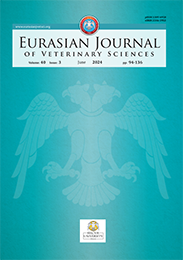| 2015, Volume 31, Number 3, Page(s) 143-147 |
| [ Summary (Turkish) ] [ PDF ] [ Similar Articles ] |
| Evaluation of acute phase proteins and cytokines in dogs with parvoviral enteritis |
| Mahmut Ok1, Cenk Er1, Ramazan Yıldız2 |
| 1Department of Internal Medicine, Faculty of Veterinary Medicine, University of Selcuk, Konya, Turkey 2Department of Internal Medicine, Faculty of Veterinary Medicine, University of Mehmet Akif Ersoy, Burdur, Turkey |
| Keywords: Dog, parvoviral enteritis, acute phase protein, cytokines |
| Downloaded:1695 - Viewed: 3267 |
|
Aim: The aim of the present study was to evaluate the alterations
in acute phase proteins and cytokines in dogs with
parvoviral enteritis.
Materials and Methods: Aged between 2 - 8 moths, fortysix dogs with parvoviral enteritis (PVE group) and 8 healthy dogs (Control group) were as material in this study. Anorexia, fever, depression, lethargy, vomiting and hemorrhagic diarrhea were determined in the dogs with parvoviral enteritis. Parvovirus infection in dogs was confirmed by examining faeces via parvovirus antigen test. Blood samples were collected from all dogs. Serum interleukin-1ß (IL-1ß), tumor necrosis factor alpha (TNF-α), interferon-γ (INF-γ), C-reactive protein (CRP), serum amyloid A (SAA), fibrinogen and protein C (PC) concentrations were measured by ELISA. Results: Serum IL-1ß, TNF-α, INF-γ, CRP, SAA, fibrinogen and PC concentrations were statistically significantly increased in the dogs with parvoviral enteritis compared to control group. Conclusions: It may be stated that increased serum IL-1ß, TNF-α, INF-γ, CRP, SAA, fibrinogen and PC concentrations may be useful in assessing the inflammation in canine parvovirus infection. |
| [ Summary (Turkish) ] [ PDF ] [ Similar Articles ] |





